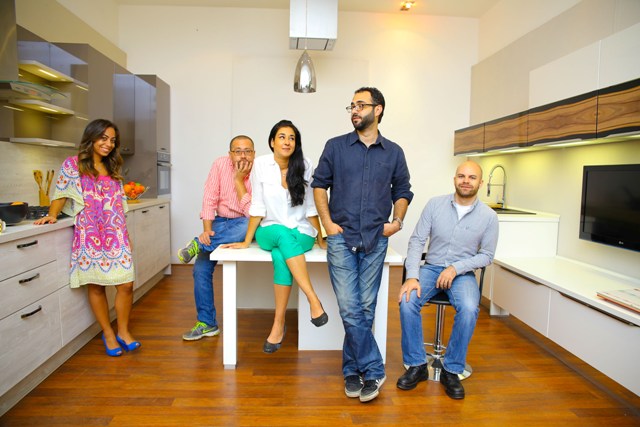Chefs Debate: Does Egyptian Cuisine Exist?
What is our national cuisine? What do Egypt's chefs want to be known for? What is the future for our food industry? Eihab Boraie speaks to chefs Rick de Jonge, Mohamed Al Bitar, Sarah Khanna, Wessam Masoud and Alia Askalany to talk taste and waste...

Time changes all and food is no exception. The evolution of food is not something to fear, but rather something to share and embrace as the highest form of love one can express with others. With kitchen equipment, agriculture, and culinary techniques constantly improving and becoming more accessible, the question becomes why do Egyptians still fail to properly represent one of the birthplaces of civilisation with an equally impressive national cuisine?
In attempt to understand the evolution and why Egyptian cuisine isn’t heralded around the world, we decided to hold a special gathering of talented chefs with various backgrounds and experience to discuss the past, present, and future of Egyptian cuisine in the food industry, at Ixina Egypt's stunning showroom.
The key to any successful dish is balancing the flavour profiles on the plate. With that in mind my first question for these professional chefs about Egyptian cuisine had to be does anyone here love koshary? Surprisingly all five chefs agree that koshary, the beloved unbalanced carb overload, is delicious, however what they do not agree on is its true origins. According to acclaimed Buttered Up food blogger Chef Sarah Khanna, “the English brought koshary from India where it’s called ‘Kitchiri’ and was initially similar to the Alexandrian style koshary which is rice and yellow Lentils. However, Egyptians love to pack a punch so we just added the tomato sauce and the pasta and the black lentils and the fried onions and it became ours!” Challenging this assessment is Chef Wessam Masoud, TV chef and restaurateur, believes “the first time koshary made it into the mainstream was somewhere in the late 19th century in Egypt which was around the time they were building the Suez Canal and they wanted something that was cheap, high protein and got the workers working. At the time we also had a very large Jewish community so we wanted something kosher.” With the spice trade in Khan el Khalili dating back centuries it would be no surprise if this beloved Egyptian dish turned out to be Indian, but for some reason when it surfaced in om el donia, Egyptians weren’t afraid then to get creative and turn this dish into their own.

Upon hearing that koshary wasn’t a truly national dish, I felt like everything I knew about Egyptian cuisine was false. With a glint in the eyes and a big smile Chef Wessam continues to shatter my world by explaining “It’s the same confusion with the Om Ali. In the late 19th Century, Ramadan and Christmas overlapped. Bread and butter pudding had already become sort of like a Christmassy dessert. Khedive Ismail famously said, we're not Arabs, we're not Africans, we are European and during his rule he had an Irish mistress named Miss Omaly. I like to think that she cooked him bread and butter pudding but used local ingredients, and that he loved it so much that it instantly became an Egyptian dessert.” It seemed that the only dish all the chefs could agree was Egyptian was Molokheya, although if you look to purchase Molokheya abroad it is often labelled Jews Mallow with some thinking it’s origins are from Israel. Trying to explain what he has learnt about Egyptian cuisine since arriving, Veteran Dutch Chef Rick de Jonge has come to understand that all dishes in this country boil down to tasting three staple ingredients “onions, garlic, and cumin.”

Egypt is, unfortunately, om el embarrassment when it comes to understanding how an ancient culture that invented everything and documented their creations using hieroglyphics happened to neglect some of their Pharaoh’s favourite recipes. Even if these national dishes exist, would Egyptians take the time to embrace it, and put the effort and energy to perfect it? Part of the problem surrounds the perceived notions that Egyptians lack the passionate work ethic necessary. “People are lazy, and fearful of the kitchen, they don’t take enough risks or go out exploring new foods. Instead they wait until someone tells them about the next trend, which always end up being years behind,” explains cooking instructor and restaurant consultant Alia El Askalany. While Chef Rick believes it is a matter of providing proper training, “there’s a lot of youth out there that want to cook but don’t know how. There is a culinary school in Egypt, a very basic one but they basically learn how to chop onions and how to deep fry them. If that would lift off then I’m sure the quality of all restaurants will go up, if they love and know what they’re doing,” - a statement that all five chefs agreed with.

In the aftermath of the January 25th revolution, Egyptians have come to learn that no matter what happens in this country people will always need to eat. This new-found understanding correlates to the current restaurant boom, as many investors seek safety in investing in gluttony. Unfortunately many of those who invest forget that behind any concept requires consistently good food, and in the search for profits, end up sacrificing food quality along the way, rendering words like 'gourmet' meaningless. “I think we overuse the word gourmet in the country. I don’t think that’s the right word, I think we’re going towards a more of a hipster kind of style. We’re young, cool and trying to do something new, but we shouldn’t call it gourmet because it sets up the customer for disappointment,” explains Chef Sarah. This sentiment is shared with her husband Chef Mohamed Al Bitar, who stars alongside his wife on CBC Sofra's Hakawy El Mashawy. He further adds that “the concept of gourmet fast food doesn’t really mix because by default a gourmet thing is an individual experience of food for you when you go to a specific place. If I’m going to localise that on a bigger level it ceases being a gourmet thing.” The truth is that finding the gourmet experience in Egypt is possible however the few restaurants that treats this culinary experience with the respect it deserves are few and far between.

Although the food industry is evolving providing restaurants with better products, both imported and locally grown, many Egyptians still lack the courage to venture into new restaurants until the establishment has built a trusted name that can take decades to build. “ElBerens and ElRefa3yie and Adoora; that’s the food culture that was engraved in us as little kid. It takes a very long time in this day in age and you can’t afford to take 20 years to become a restaurant,” explains Chef Mohamed. It is for that reason one can argue that Egyptian stubbornness and food preferences are the result of the childhood programming of an aging generation, unwilling to waver from traditions.
In Egypt, chefs are paid terribly and sadly, society tends to look down upon it as a profession. Outside of Egypt, chefs are considered among the most important craftsmen and those who do it well establish internationally acclaimed restaurants and find themselves being heralded as celebrities. This is slowly beginning to happen in Egypt, thanks to the establishment of dedicated cooking channels that aim to educate Egyptians about new techniques while highlighting new uses for parts of food we tend to foolishly discard. “Egyptians raise a very unique breed of sheep that have this tail fat which in Arabic is called Leyya that is usually discarded. This piece could be used in so many different dishes to add so much flavour; you can use it as fat in your burgers, or fry French fries using it as a delicious replacement to Europe’s use of lard,” explains Chef Mohamed. This waste of exclusive products is baffling especially in a country still trying to define its cuisine.
As always, nothing will change until the market demands it. When the market demands, suppliers deliver, and if the market demanded higher standards instead of larger portions, then chefs would not only supply the demand, but take pride in their own work, collectively raising the bar throughout all restaurants wanting to thrive. According to Chef Wessam, “If your dining decision is based on 'will this fill me up or not?' then it’s very difficult for me to serve you food. Because what that tells me, as a business owner, is I have to serve you half a kilo of mashed potatoes that taste like nothing, and have the texture of wallpaper paste. I have to serve you Sudanese fillet – which is over cooked and has zero flavour, and smother it in a very salty very MSG rich sauce that comes out of a box. It’s very important for the Egyptian consumer to understand the real value not the perceived value. They see it as quantity, when it should always be about the quality.”

Hopefully the next trend will involve an increase in quality, while giving chefs the respect they deserve. Encouragingly the variety of quality imports and products are getting better with new items like mangosteen, thyme and zucchini blossoms reaching our market. 10 years ago items like these would be impossible to find, so there are definitely new opportunities to enhance Egyptian flavours.
In order for any sort of culinary revolution to be deemed successful, responsibility will fall on today’s generation to teach the next. “Good food starts at home. If you take your kid out to a restaurant, don’t let them order fried foods, otherwise they will grow up craving unhealthy and uninspired fried foods for comfort,” explains Chef Wessam. Chef Mohamed insists that “in terms of the future of food, so long as its money oriented and not taste oriented it’s not going anywhere.” As our conversation ended I felt slightly ashamed at the lack of internationally recognised Egyptian dishes, but at the same time felt optimistic about its future. I could think of no better role model than these five passionate chefs, who are doing their part to prove the kitchen is nothing to fear, as a nation’s pride is counting on the future delicious creations and culinary inspirations that will come out of it.
Discover Ixina kitchens at 35 Ahmed Heshmat Street, Zamalek.
- Previous Article Egypt's Journalist Syndicate Holding Protest Right Now
- Next Article The Garden X Fashion for a Stylish Ramadan
























